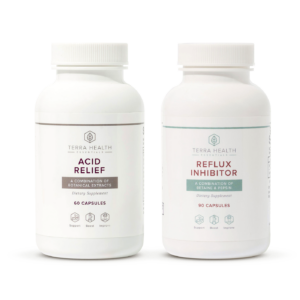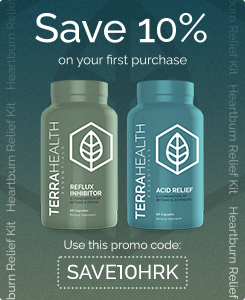Almost half of the US population suffers from GERD (gastroesophageal reflux disease) symptoms. Acid blockers are usually the first port of call for these patients. But many don’t get any relief from these overly prescribed medications and are left stumped about what to try next. There are a few reasons why this situation is so prevalent. So we’re going to look at how acid reflux actually happens, why acid blockers often don’t work, and what you can do to solve your acid reflux problem for good.
What Actually IS Acid Reflux?
Acid reflux occurs when the contents of your stomach travel back up your esophagus through an open lower esophageal sphincter muscle. This leads to painful symptoms such as heartburn and indigestion. The LES is a “valve” of sorts so it’s pretty important that it functions properly in order to avoid reflux. When your stomach acid levels are high, this signals your LES to tighten to stop acid from getting through. However, when your stomach acid is LOW, your LES starts to loosen. This allows acid to escape into your esophagus and boom – reflux sets in.
 This further cements the common misconception that acid reflux results from excess levels of stomach acid. This line has been sold to us by big pharma for decades, but it’s rarely the case. The majority of people suffering from acid reflux have insufficient levels of stomach acid. That’s right, you don’t have “too little” stomach acid, you don’t have enough! Research has shown the connection between low stomach acid and high incidences of acid reflux. People with higher levels of stomach acid are less prone to developing acid reflux.
This further cements the common misconception that acid reflux results from excess levels of stomach acid. This line has been sold to us by big pharma for decades, but it’s rarely the case. The majority of people suffering from acid reflux have insufficient levels of stomach acid. That’s right, you don’t have “too little” stomach acid, you don’t have enough! Research has shown the connection between low stomach acid and high incidences of acid reflux. People with higher levels of stomach acid are less prone to developing acid reflux.
Why Stomach Acid is Important
When you’re producing enough stomach acid, your stomach acid will signal your LES to close. When stomach acid production decreases, this is referred to as a condition called hypochlorhydria. This reduction in the levels of stomach acid can be due to factors such as aging, stress, caffeine intake, medications (especially proton-pump inhibitors which block the production of acid), and alcohol. It’s estimated that up to 21% of people in the 60 – 69 year age bracket, and 31% of people from 70-79 experience hypochlorhydria. This goes up to 37% in people over the age of 85. People who have other GI issues such as IBS are at a significantly higher risk of developing low stomach acid.
It’s important to take this condition seriously. Stomach acid levels are vital in order for our immune systems to function properly and for optimal nutrition absorption. The digestive process starts in our mouths as soon as we consume food. The food is partially broken down by chewing and by enzymes which are secreted in saliva. Once it’s traveled down the esophagus to the stomach, it’s further digested with the aid of hydrochloric acid which is naturally produced by your body. This helps to further extract nutrients from the food.
How HCL Works
- Stimulating the secretion of pepsin for protein digestion.
- Stimulating the release of pancreatic enzymes to help digest carbs and fats and prevent SIBO.
- Aiding absorption of important vitamins and minerals.
- Destroying any harmful bacteria that may enter the body through food.
- Neutralizing candida infections.
- Regulating gastric motility and emptying.
- Making sure your stomach has an acidic PH to absorb certain nutrients such as magnesium.
- Activating digestive enzymes and bile to break down proteins, fats, and carbohydrates.
- Preventing disease by killing disease-causing yeast and bacteria found in food.
- Breaking food down into smaller pieces that can be digested more easily.
- Trigger the LES to close properly to prevent acid reflux.
The Dangers of Acid Blockers
Proton-pump inhibitors work by stopping acid production in the stomach, but they don’t stop the contents of the stomach from flowing back up the esophagus. Instead, they lower the acid levels so that there isn’t much acid to flow back up. This is a short-term fix with regard to reflux. It merely addresses symptoms and doesn’t solve the root cause of the malfunctioning LES..
“Far more people with symptoms of heartburn are started on PPIs, do not derive benefits from them, and continue to use them because no one makes an effort to take them off the drugs.”
– Dr. Kyle Staller, Gastroenterologist, Massachusetts General Hospital.
Not a Long-Term Solution
Whilst PPIs are considered safe enough as a short-term measure, they don’t solve the problem of reflux. Most people end up on them long-term, if not for life. And this is a big concern. Studies have found that PPIs are linked to low levels of vitamin B12, reduced calcium absorption, increased risk of pneumonia, and even an increased susceptibility to hip fractures. Several studies of people who use PPIs for years have also found those participants to be at an increased risk of developing conditions such as heart attacks, chronic kidney disease, and dementia.
 Even more disturbingly, a 2018 study published in Gastro Journal concluded that PPIs increase the risk of stomach cancer. In an examination of 63,397 patients for 7.6 years who had been prescribed long-term acid blockers, the longer they took the medication, the more the risk increased. After just one year, the study revealed that this risk was 500% greater than individuals not taking acid blockers.
Even more disturbingly, a 2018 study published in Gastro Journal concluded that PPIs increase the risk of stomach cancer. In an examination of 63,397 patients for 7.6 years who had been prescribed long-term acid blockers, the longer they took the medication, the more the risk increased. After just one year, the study revealed that this risk was 500% greater than individuals not taking acid blockers.
A dependency develops on these acid blockers that results in a massively increased production of stomach acid once it is discontinued. This causes acid reflux symptoms to flare up in a big way. In a trial of 48 people which was published by the American Journal of Gastroenterology, it was concluded that a mere month-long course of proton pump inhibitors resulted in acid reflux symptoms when the medication was stopped – EVEN in individuals who were previously asymptomatic. In this trial, it took an average of 3 weeks for these rebound symptoms to stop.
The Symptoms of Low Stomach Acid
This overview will help you to surmise whether low stomach acid is at the core of your acid reflux.
Symptoms include:
- Feeling full right after eating a normal-sized meal.
- Bloating
- Flatulence (particularly 1-2 hours after eating, and in the case of foul-smelling flatulence especially)
- Heartburn
- Reflux
- Burping
- Indigestion
- Diarrhea
- Acne
- Low iron
- General vitamin and mineral deficiencies
- Brittle nails
- Fatigue
In the case of foul-smelling burps and flatulence, this is due to the fermentation of the food you eat as it lies in your stomach. When your stomach acid levels are low, digestion is difficult, and bacteria manage to hang around in your stomach and feast on this food which produces that inconvenient gas. Have you ever literally tasted your food in your mouth when you burp a few hours after eating? This means the food is still sitting in your stomach when it should have reached your small intestine. When this happens, bloating also sets in, food can start pushing back up through your LES – and hello acid reflux.
Finding the Right Supplements for Low Stomach Acid
Betaine hydrochloride (HCL) and digestive enzymes are the most utilized supplements for treating low stomach acid. Alongside the number of functions of HCL we listed earlier in the article, it primarily stimulates the production of acid in your stomach to improve digestion and trigger your LES to seal tight, preventing reflux. With enough HCL, your acid reflux symptoms and more serious conditions such as GERD can be alleviated and resolved for good.
 Our Heartburn Relief Kit contains a custom blend of ingredients that leads with Betaine HCL combined with Pepsin – a key enzyme to assist with the breakdown of protein. In addition to soothing ingredients such as Slippery Elm Bark to help to ease the painful symptoms of reflux whilst we work to resolve the root cause.
Our Heartburn Relief Kit contains a custom blend of ingredients that leads with Betaine HCL combined with Pepsin – a key enzyme to assist with the breakdown of protein. In addition to soothing ingredients such as Slippery Elm Bark to help to ease the painful symptoms of reflux whilst we work to resolve the root cause.
Just because you’ve been suffering from acid reflux for a long time, it doesn’t mean that it cannot be cured. You’ve simply been treating it the wrong way.
Purchase the Heartburn Relief Kit right now with our custom 30% off code for Terra Health readers: acidrefluxmgt30

